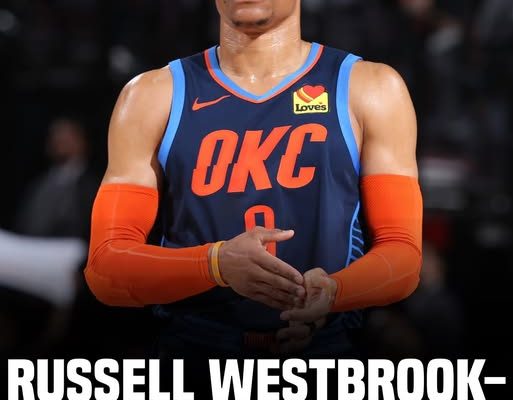Russell Westbrook Returning to OKC Thunder Looks Unlikely Despite Fans’ Hopes and Team’s History Together
The idea of Russell Westbrook reuniting with the Oklahoma City Thunder has generated significant buzz among fans and media alike, but insiders and analysts increasingly consider such a reunion unlikely. The former MVP and franchise icon’s time in Oklahoma City was marked by spectacular athleticism, relentless energy, and memorable playoff moments. Yet, with the franchise moving in a different direction and Westbrook’s career taking various twists and turns, the prospect of him returning to the Thunder seems more like a nostalgic fantasy than a realistic scenario.
Russell Westbrook was drafted by the Seattle SuperSonics with the fourth overall pick in the 2008 NBA Draft, a team that immediately relocated and became the Oklahoma City Thunder. Westbrook’s development into an explosive guard was closely tied to the growth of the Thunder franchise, alongside Kevin Durant and James Harden. This trio gave Oklahoma City one of the most exciting young cores in the league for several seasons. Westbrook’s relentless drive and triple-double performances earned him the MVP award in the 2016–2017 season, further cementing his legacy with the franchise.
Despite this storied past, Westbrook’s departure from Oklahoma City in 2019 marked a clear turning point. The Thunder traded him to the Houston Rockets in a deal primarily aimed at acquiring Chris Paul, signaling a rebuild phase for Oklahoma City. The trade represented a pivot away from the era defined by Westbrook’s aggressive style of play, toward a new vision focused on young talent and long-term flexibility.
Since then, Westbrook has moved through multiple teams, including the Rockets, Washington Wizards, Los Angeles Lakers, and currently the Utah Jazz. Throughout these stints, he has faced challenges adapting to different systems, roles, and teammates. While his intensity and playmaking ability remain undeniable, his style has sometimes conflicted with modern analytics-driven team strategies, leading to questions about his fit with certain rosters.
On the other side, the Thunder have embraced a youth movement built around promising players like Shai Gilgeous-Alexander, Josh Giddey, and others. Under the leadership of general manager Sam Presti, the organization is focused on developing a sustainable core that can contend in the future. This approach emphasizes versatility, shooting efficiency, and defensive capabilities, areas where Westbrook’s game is sometimes considered less compatible given his turnover rates and shooting struggles.
Financial considerations also play a significant role in the low likelihood of a reunion. Westbrook’s contract demands and salary cap implications could conflict with the Thunder’s desire to maintain financial flexibility while nurturing young talent. Taking on a high-priced veteran like Westbrook could limit the team’s ability to add complementary players or pursue other strategic moves in free agency.
From a basketball standpoint, there’s also the question of fit. Westbrook’s aggressive style, which thrived as a primary ball-handler, may clash with the Thunder’s emerging stars who need the ball to grow and shine. Reintegrating Westbrook into a system where he is not the centerpiece would require adjustments from all parties. At this stage in his career, Westbrook’s best contributions may come from teams needing a high-energy, experienced guard in a more defined role — something the Thunder are unlikely to prioritize while focusing on their young core.
Moreover, Westbrook himself may be seeking opportunities that align better with his career goals and playing style. A return to Oklahoma City, where the team is in transition and focusing on long-term growth, may not offer the immediate chances for success or prominence that a veteran like Westbrook might prefer.
Beyond basketball, Westbrook and the Thunder organization share mutual respect and gratitude for the past. Westbrook’s time in Oklahoma City was marked by community engagement, leadership, and memorable performances that endeared him to fans. The franchise’s decision to trade him was difficult but necessary for their rebuilding process. Both sides understand the importance of moving forward rather than looking backward.
Despite this, the recurring media speculation about a possible reunion reflects the emotional bond and nostalgia surrounding Westbrook’s era in Oklahoma City. Fans yearn for the excitement he brought to the team, and the narrative of a homecoming appeals to the romantic side of sports fandom. However, the realities of the modern NBA — including team-building philosophies, salary constraints, and player preferences — weigh heavily against such a scenario.
Ultimately, the Thunder are focused on shaping their future through the development of their young stars and strategic asset management. While Westbrook’s impact on the franchise’s history is undeniable, the organization must prioritize its long-term goals over sentimental moves. For Westbrook, continuing his career with teams that can utilize his strengths and offer roles fitting his current stage will likely take precedence over returning to Oklahoma City.
In conclusion, a Russell Westbrook-OKC Thunder reunion, though a popular topic for speculation, appears improbable given the contrasting directions of the player and the franchise. The Thunder’s youth-driven rebuild, financial considerations, and team fit challenges all suggest that the partnership that once electrified fans is unlikely to be rekindled. Both Westbrook and Oklahoma City have moved on, each pursuing new chapters in their basketball journeys — a testament to the evolving nature of the NBA and the business behind the game.



